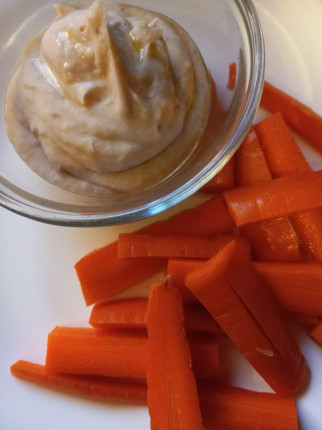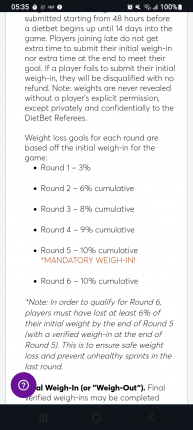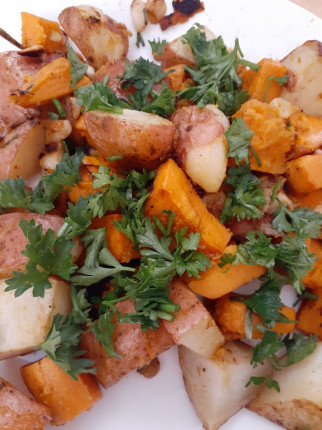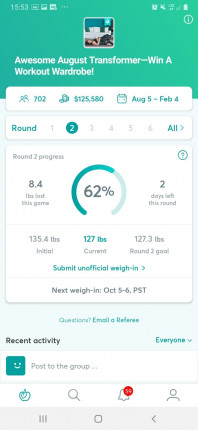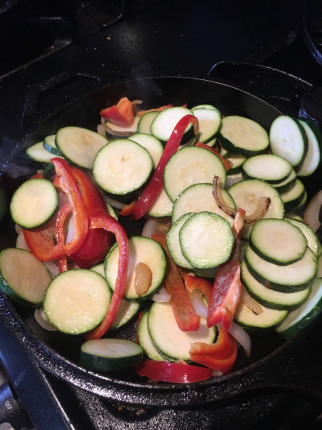Jan 07, 2024What are your goals for the upcoming week?
In non-diet life, I can usually stay at my ideal weight just by ensuring 80-90% of what I eat is who...
See moreHow many days did you exercise last week?
6
How would you rate your diet last week?
5
What are your goals for the upcoming week?
In non-diet life, I can usually stay at my ideal weight just by ensuring 80-90% of what I eat is whole foods and that about half of that is vegetables, another quarter is beans and whole grains, and the rest is other good stuff like nuts, fruits, a small amount of meat (rarely the main event), and minimally processed things like oil, tofu, tortillas, fermented things, etc. This is how my family ate growing up for the most part, so it's habit as much as a choice. Nothing is forbidden (except things I'm actually allergic to, of course!), but the core of my diet is food made from scratch. Straying from those habits inevitably leads to pretty rapid gain.
To lose at a steady pace, I track calories and get back into the homemade food rhythm.
I like to frame my eating in terms of goals rather than restrictions, so while I do largely eschew ultra-processed foods, I prefer to think about the good things I'm getting from the meals my husband and I make. Am I getting closer to my calcium goal (set by my obgyn)? Did I eat enough protein to support my strength-building goals? How many of the daily dozen* did I get today? Did I feel good after eating? If I focus on those positive goals, then there's no feeling of restriction.
Hyperpalatable food is hard to stop eating once I start, so I don't make it part of grocery shopping. If I want a bag of chips, fine, but I have to walk to the convenience store to get it, which means I have to think about whether or not I *really* want a bag of chips. Sometimes I do, and that's fine. Sometimes I don't. When I do buy such "edible entertainment" (as I call it), I pay for it with my fun money -- the money I dedicate towards experiences like travel or theater tickets or books. I don't pay for it from the grocery budget. I think that's an important distinction psychologically. It's something I started when I was a (literally) starving college student. Food had a purpose -- keeping me alive and healthy. Food products were unnecessary and provided little to no nutrition or satiety with relation to the money spent. I could eat for an entire day with what a bag of chips cost.
I feel awful when I don't eat at least 30% of my calories through carbs. While I have known many people who have done low carb and keto diets successfully to lose weight quickly for events like a wedding, I don't know anyone who's stuck with it long-term. My anecdata doesn't mean no one can, but it does make me suspect it's just one way to temporarily reduce calorie intake and is not sustainable long-term/does not help the dieter practice habits that will lead to healthy maintenance. Outside of the Mediterranean Diet, that's about how I feel about every diet with a name or gimmick.
*I really like Dr. Gregor's daily dozen as an aspirational checkoff list to ensure variety in the foods I eat. I disagree with him strongly with regards to added fats (I think things like olive oil and avocado oil are beneficial). The only source I really trust when it comes to diet is the Harvard School of Public Health. I also trust the food habits passed down from generations of my family. I grew up in a time when a lot of my peers were having Pop Tarts for breakfast and TV dinners regularly, but my family made nearly everything from scratch. I absolutely supplemented junk food purchased with my allowance, but it was never a *meal*. I am so, so grateful for what my family taught me about food.
See less 

